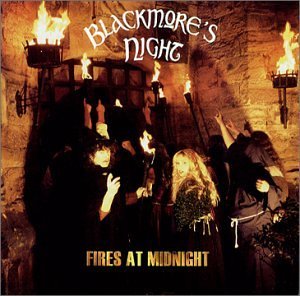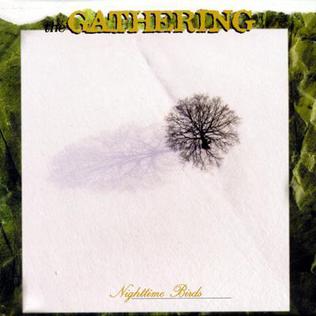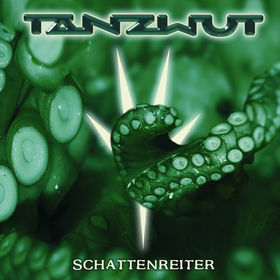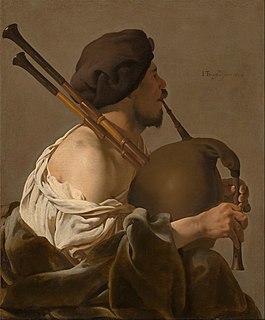
Blackmore's Night is a British/American traditional folk rock band formed in 1997, consisting mainly of Ritchie Blackmore and Candice Night. Their lineup has seen many changes over the years. To date, they have released ten studio albums.

Tanzwut is a German Neue Deutsche Härte and medieval metal band which originated as a side project of Corvus Corax-members. The band uses a medieval theme during their live performances which are expressed through their stagecraft, costumes and choreography.

In Extremo is a German medieval metal band originating from Berlin. The band's musical style combines metal with medieval traditional songs, blending the sound of the standard rock/metal instruments with historical instruments. Versions of well-known traditional/medieval ballads make up the main part of their repertoire, but the band has written an increasing share of original material in recent years. Their own material is written in German, whilst the traditional songs are in a variety of languages, including Gaelic, Spanish, English, Norwegian, Swedish, Icelandic, French, Estonian, Galician, Hebrew, Latin, Ladino, Occitan, Old High German and Middle High German.
Silly is a German rock band. Founded in East Germany in 1977, Silly was one of the country's most popular music acts, and was well known for its charismatic lead singer Tamara Danz. Her death in 1996 ended the band's recording career after 18 years. In 2005 the surviving members began to perform as Silly again, first with several guest singers, before choosing actress Anna Loos to replace Danz. The first album with the new line-up, Alles Rot, became the band's most successful to date, reaching number 3 on the German charts in 2010.

Corvus Corax is a German band known for playing neo-Medieval music using authentic instruments. Their name is the Latin name for the common raven. The band was formed in 1989 by Castus Rabensang, Wim (Venustus) and Meister Selbfried in East Germany. The band often uses bagpipes as the solo instrument; their live performances attract attention with the bizarre look of the musicians being reminiscent of ancient Greek myths: half-naked, dressed in unusual clothes, wearing primitive tribal decorations, often tattooed.

Fires at Midnight is the third studio album by the group Blackmore's Night, released July 10, 2001 through SPV/Steamhammer. In comparison to their previous two releases, there are more electric guitar parts on this album, whilst maintaining a folk rock direction. The album was a Top Ten record in Germany.

Nighttime Birds is the fourth full-length album of the Dutch band The Gathering, released on 6 June 1997 by Century Media Records. The album was recorded at Woodhouse Studios, Hagen, Germany between 17 February and 15 March 1997 under the guidance of producer Siggi Bemm.

Velvet Darkness They Fear is the second studio album by the Norwegian gothic metal band Theatre of Tragedy. It was released in 1996 by Massacre Records. The album was issued in the US by Century Media Records in 1997.

Spirit is the first full-length album by the Swiss folk metal band Eluveitie. It was released on June 1, 2006, by Fear Dark Records and re-released by Twilight Records in 2007.

Winter Carols is the sixth studio album by the group Blackmore's Night, released in the United Kingdom on October, 2006, and in the United States on November 7, 2006. It is a Christmas themed album. The cover artwork for this album, painted by Karsten Topelmann, is an adaptation of a street in Rothenburg ob der Tauber, Germany, in line with the band's heavy Renaissance influence. The same street is portrayed in the cover of Blackmore's Night's second studio album, Under a Violet Moon. In the cover of "Winter Carols" the street is painted as winter time, whereas Under a Violet Moon's cover takes place on apparently a summer night. While the selections "Winter " is credited to Ritchie Blackmore as composer, it is an adaptation of the second section of Joaquin Rodrigo's "Fantasía para un gentilhombre," which Rodrigo composed for classical guitar virtuoso Andres Segovia in 1954.

Faun is a German band formed in 1998 who play pagan folk, darkwave and medieval music. The originality of their music style is that they fall back to "old" instruments, and the singing is always the center of attention. The vocals are performed in a variety of languages, including German, Latin, Greek, and Scandinavian languages. Their instruments include Celtic harp, Swedish nyckelharpa, hurdy-gurdy, bagpipes, cittern, flutes and many others.

Sünder ohne Zügel is the third folk metal album by the German band In Extremo. It was released in 2001 by Island Records.

Verehrt und Angespien is the second medieval folk metal album by the German band In Extremo. It was released in 1999 by Mercury Records.

Schattenreiter is the fourth full-length studio album by the German industrial rock/medieval metal band, Tanzwut. Schattenreiter was released on April 7, 2006 by PICA Music as a two-CD digipack. The album marks their newfound sound, which incorporates a more down-tuned use of guitars, darker atmospheres and harsher vocals at times than their previous albums, making them lean towards industrial metal.

Ihr Wolltet Spass is the third full-length studio album by the German industrial rock/medieval metal band, Tanzwut. It was released in 2004 by PICA Music in a digipack. The album shows Tanzwut's sound gravitating towards a more industrial metal sound, due to its new lineup with the addition of Hatz and Ardor and electronic instruments used in the genre.

Tanzwut is the first full-length studio album by the German industrial rock/medieval metal band, Tanzwut. It was released on 1 March 1999 by EMI Music.

"Bitte bitte" [Please please] is a song by Die Ärzte. It's the eleventh track and the third single from their 1988 album Das ist nicht die ganze Wahrheit.... It's about wanting to obey to a dominatrix.

Saltatio Mortis is a German medieval metal group. The Latin name means "dance of death". It is an allusion to the Danse Macabre, and a motto of the band is: "He who dances does not die."
Foppt den Dämon! is the third full-length studio album by German folk metal band Subway to Sally. This album features an interesting development in Subway to Sally's musical style. While still partially maintaining the Folk Rock sound from previous album, the rest of the record shows the band going for a more Folk Metal sound that would continue with the next record, Bannkreis.






















